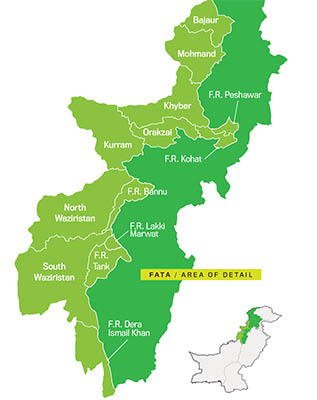
Minhaj Ahmed Rafi for Newsweek
A timeline of FATA’s role in Pakistan following Partition in 1947.
Timeline
1948
Tribesmen deployed for Kashmir war.
1955
During One Unit rule, the tribal areas were represented in both the National Assembly and the West Pakistan Provincial Assembly. The belt could have been merged with the North West Frontier Province (now Khyber-Pakhtunkhwa) on One Unit dissolution, but wasn’t.
1976
Gen. Naseerullah Babar, retired, leads committee to explore integration of the tribal belt with the NWFP.
1996
Adult Franchise Act allows for direct representation in the National Assembly.
2002
Local-government system approved for expansion to the tribal belt.
2004
Political agent uses his powers to nominate largely ceremonial local-government officials, causing public rejection of the system.
2005
Justice Mian Mohammad Ajmal, retired, leads committee to recommend key changes to the resented British-era Frontier Crimes Regulations.
2006
Retired bureaucrat Imtiaz Ahmad Sahibzada leads committee to propose reforms in the region; PMLN and PPP agree on FATA reforms in their Charter of Democracy
2008
PPP government forms Cabinet Reforms Committee led by Farooq H. Naek to review Ajmal committee modifications to the Frontier Crimes Regulations.
2012
The FATA Local Government Regulation, 2012, is prepared but not promulgated; Khyber-Pakhtunkhwa Assembly unanimously resolves to reflect FATA representation.
2013
PMLN makes FATA reforms a key feature of its election manifesto.
2014
Operation Zarb-e-Azb is launched in June and displaces over 1 million; Army Public School, Peshawar, is attacked in December, leading to the 12-point National Action Plan (NAP), which also emphasizes FATA reforms.
September 2015
FATA reps in the National Assembly move bill seeking the tribal belt’s integration with Khyber-Pakhtunkhwa.
November 2015
Prime Minister constitutes FATA Reforms Committee with Sartaj Aziz; Zafar Iqbal Jhagra; Lt. Gen. Abdul Qadir Baloch, retired; Zahid Hamid; and Lt. Gen. Nasser Khan Janjua, retired.
December 2015
FATA reps put forward seven-point memo on integration.
August and September 2016
After eight months of talks with stakeholders, the Aziz committee presents its findings to the Prime Minister and National Assembly.
March 2017
Federal Cabinet approves Aziz committee recommendations on integration and Frontier Crimes Regulations’ repeal; 100 tribal leaders challenge this at Supreme Court.
Snapshot
Population: 4.8 million
Population under 15: 43.3%
Literacy Rate: 33.3%
Female Adult Literacy: 12.7%
Size: 27,200 km²
Areas:
Seven agencies (Bajaur, Khyber, Kurram, Mohmand, North Waziristan, Orakzai, South Waziristan) and
Six frontier regions (F.R. Bannu, F.R. Dera Ismail Khan, F.R. Kohat, F.R. Lakki Marwat, F.R. Peshawar, F.R. Tank)
Constitution
Article 247(6): ‘The President may, at any time, by Order, direct that the whole or any part of a Tribal Area shall cease to be Tribal Area, and such Order may contain such incidental and consequential provisions as appear to the President to be necessary and proper: Provided that before making any Order under this clause, the President shall ascertain, in such manner as he considers appropriate, the views of the people of the Tribal Area concerned, as represented in tribal jirga.’
Recommendations
The Aziz-led committee examined four options: (i) maintain status quo but introduce judicial and admin reforms, increase development work; (ii) create a FATA Council on the pattern of Gilgit-Baltistan; (iii) make FATA a separate province; and (iv) integrate FATA with Khyber-Pakhtunkhwa. It recommends:
Five-year transition to FATA’s full integration with Khyber-Pakhtunkhwa.
Program to urbanize the region and also link it with China-Pakistan Economic Corridor (CPEC) initiative projects. In addition to the existing annual development allocation of Rs. 21 billion, FATA to receive about Rs. 90 billion each year for 10 years.
Replacement of the Frontier Crimes Regulations with a new Tribal Areas Riwaj Act; the role of the political agent to be stripped of its judicial functions; agency judges to preside over jirgas, whose decisions can be appealed at the High Court and Supreme Court.
20,000 law-enforcement personnel headed by the provincial police to ensure that reforms do not fail and transform FATA from a ‘geo-political buffer’ into Pakistan proper. ‘FATA reforms are a process and not an end in themselves,’ it says, advising constant review and tenured officers.
Local-bodies elections this year, and FATA’s first elections for representation in the Khyber-Pakhtunkhwa Assembly next year, at the time of general elections.
From our March 18 – April 1, 2017, issue.
